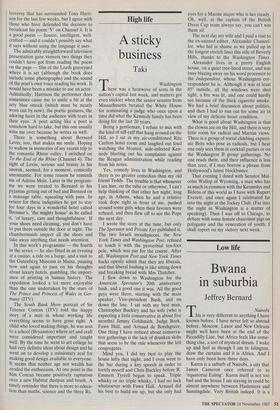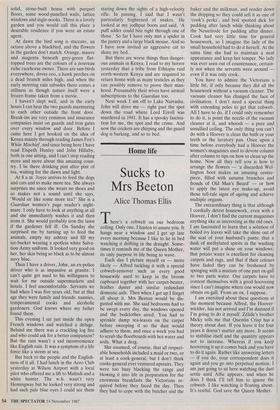Low life
Bwana in suburbia
Jeffrey Bernard Nairobi his is very different to anything I have known before. I have never felt so abroad before. Moscow, Luxor and New Orleans might well have been at the end of the Piccadilly Line, but Africa feels like some- thing else, a sort of mystical dream. I wake up and feel as though I am in Islington, draw the curtains and it is Africa. And I have only been here three days.
Karen is a suburb of Nairobi, a city that James Cameron once referred to as `equatorial Ealing'. Karen itself is not too bad and the house I am staying in could be almost anywhere between Haslemere and Sunningdale. Very British indeed. It is a solid, stone-built house with parquet floors, some wood-panelled walls, lattice windows and ingle-nooks. There is a lovely garden and you would call this place a desirable residence if you were an estate agent.
At dawn the bird song is staccato, an octave above a blackbird, and the flowers in the garden don't match. Orange, mauve and magenta beneath grey-green flat- topped trees are the colours of a nouveau riche racehorse owner. There are sun-birds everywhere, doves coo, a hawk perches on a dead branch miles high, and when the early morning rain subsides there comes a stillness as though nature itself were a frozen frame taken from a movie.
I haven't slept well, and in the early hours I can hear the two guards murmuring to each other outside the front door. Break-ins are very common and insurance companies insist on guards and iron gates over every window and door. Before I came here I got hooked on the idea of Kenya mainly through reading James Fox's White Mischief, and since being here I have read Elspeth Huxley and John Hillaby, both in one sitting, and I can't stop reading more and more about this amazing coun- try. I lie there drinking pint after pint of tea, waiting for the dawn and light.
At 8 a.m. Joyce arrives to feed the dogs and cats and to make more tea. She always surprises me since she wears no shoes and so makes not a sound until she says, `Would sir like some more tea?' She is a Guardian women's page reader's night- mare. I only have to look at anything at all and she immediately washes it and then irons it. She would probably iron the lawn if the gardener fell ill. On Sunday she surprised me by turning up to feed the animals, empty my ashtray and fill my ice-bucket wearing a spotless white Salva- tion Army uniform. It looked very good on her, her skin being so black as to be almost navy blue.
Then I have a driver, John, an ex-police driver who is as impassive as granite. I can't quite get used to his willingness to wait for me outside supermarkets and hotels. I feel uncomfortable. Servants we had when I was five years old, but at that age they were family and friends: nannies, temperamental cooks and alcoholic gardeners. God knows where my father found them.
This evening I sat just inside the open French windows and watched a deluge. Behind me there was a crackling log fire and who could ask for a better companion? But the rain wasn't a sad inconvenience like English rain. It was a symptom of a life force like a storm at sea.
But back to the people and the English- ness of it all. I had lunch in the Aero Club yesterday at Wilson Airport with a local pilot who offered me a lift to Malindi and a white hunter. The w.h. wasn't very Hemingway but he looked very strong and had such pale blue eyes I could see them staring down the sights of a high-velocity rifle. In passing, I said that I wasn't particularly frightened of snakes. He looked at my jodhpur boots and said, 'A puff adder could bite right through one of those.' So far I have only met a spider in the pantry and a large black mouse. And so I have now invited an aggressive cat to share my bed.
But there are worse things than danger- ous animals in Kenya. I read to my horror yesterday that a tribe from Ethiopia raid north-western Kenya and are required to return home with as many testicles as they can possibly remove to prove their man- hood. Presumably their wives have airmail subscriptions to the Guardian too.
Next week I am off to Lake Naivasha. John will drive me — right past the spot down the road where Lord Erroll was murdered in 1941. It has a spooky fascina- tion for me, the spot and the crime. And now the crickets are chirping and the guard dog is barking, and so to bed.











































































 Previous page
Previous page